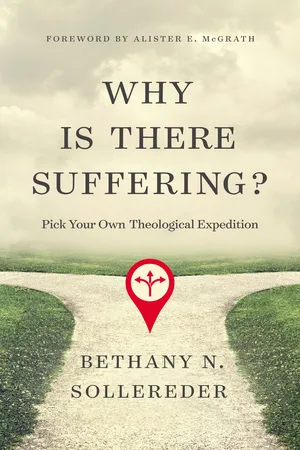
- 144 pages
- English
- ePUB (mobile friendly)
- Available on iOS & Android
About this book
Your journey begins. The road before you is smooth and straight. You walk for some time, recalling your experiences that call into question the deep realities of life. Up ahead, you can see the road branching in three directions. . .
In Why Is There Suffering? you, reader, control the route you take through its "choose-your-own-path" chapters, asking questions and exploring different theological possibilities on the big topics of:
- God's existence
- God's nature
- The nature of suffering
- Evil
- Pain
- Final destiny
Taking an intentionally light-hearted approach to a heavy topic this book presents an illustrative introduction to the problem of suffering and the most commonly offered responses to it. Along the road, you'll face multiple possibilities regarding suffering and its theological explanations, and you'll make choices about which one you find most plausible, skipping to that section of the book. Each decision you make leads to further complexities and new choices that reveal how theological beliefs lead to certain conclusions.
This book does not offer final answers. Instead, it introduces the "theological" possibilities—both Christian and non-Christian—that you can explore and wrestle with to make informed decisions about your beliefs and clearly see the road you've taken to reach such beliefs.
You are, of course, in control of the paths you take through these pages. You decide which explanations work. You can always go back and see what would change if you'd taken a different path. And, who knows. . .you may find that certain pathways resonate with your experiences in ways you didn't expect.
Frequently asked questions
- Essential is ideal for learners and professionals who enjoy exploring a wide range of subjects. Access the Essential Library with 800,000+ trusted titles and best-sellers across business, personal growth, and the humanities. Includes unlimited reading time and Standard Read Aloud voice.
- Complete: Perfect for advanced learners and researchers needing full, unrestricted access. Unlock 1.4M+ books across hundreds of subjects, including academic and specialized titles. The Complete Plan also includes advanced features like Premium Read Aloud and Research Assistant.
Please note we cannot support devices running on iOS 13 and Android 7 or earlier. Learn more about using the app.
Information

CHAPTER 1
What Is God Like?

CHAPTER 2
God Is Love

CHAPTER 3
God Is All-Powerful
and All-Knowing
Table of contents
- Cover Page
- Title Page
- Copyright Page
- Dedication
- Contents
- The First Decision
- Foreword
- Introduction
- 1. What Is God Like?
- 2. God Is Love
- 3. God Is All-Powerful and All-Knowing
- 4. Suffering Is a Mystery
- 5. Living With Mystery All the Way Down
- 6. God Has a Plan
- 7. Freedom
- 8. God Has Limited Power
- 9. God Does Not Know the Future
- 10. God At War
- 11. God Can’t Stop Evil
- 12. You Meet a Monk
- 13. God Exists But Doesn’t Love You
- 14. God Is Neutral
- 15. God Doesn’t Exist
- 16. God Is Not Interested
- 17. God Woos Creation
- 18. Non-Christian Redemption
- 19. Protest
- 20. Meaning Is Self-Made
- 21. Circle of Life
- 22. Existence Is a Great Mystery
- 23. God Creatively Responds
- 24. Into the Rain
- 25. Into the Fog
- 26. When God Became Human
- 27. God Acts In Various Ways
- 28. Miracles
- 29. Divine Lure
- 30. Meaning Making
- 31. God Suffers With Us
- 32. The Garden
- 33. Individual Suffering
- 34. Heaven and Hell
- 35. Animal Salvation
- 36. Animal Souls Cannot Survive Death
- 37. Limited Animal New Creation
- 38. Heaven and Hell Both Exist
- 39. The Grey Town
- 40. Annihilationism
- 41. Universalism
- Afterword
- Acknowledgments
- Appendix 1: The Flowchart
- Appendix 2: The Map
- Bibliography